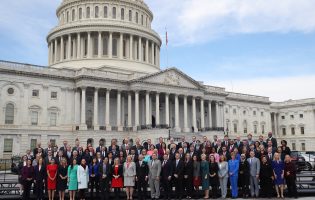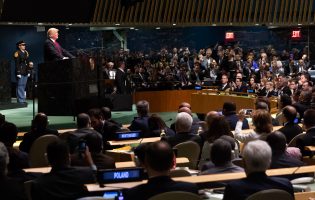
Europe Faces Open Doors but Uphill Battles with New Congress
“The U.S. is bigger than the White House,” declared German foreign minister Heiko Maas in a recent interview. In response to President Trump’s well-documented ambivalence toward alliances, German leaders are …

Remembering George H. W. Bush and Germany: A True Partner in Leadership
The death of former president George H. W. Bush will be mourned in Germany as well as in his home country. He was, along with Harry Truman, the most consequential …

Transatlantic Relations after the Midterms
A Fresh Start or Further Decline? Since President Trump began implementing his vision of “America First” two years ago, European partners have been concerned whether a more unilateral and transactional …

A Strained, Yet Indispensable Partnership: German-American Relations in the Age of Donald J. Trump
For the past seventy years, the German-American and the European-American partnership has rested on a shared understanding of common goals: The transatlantic partners believed that the promotion of democracy, rule …
A New Approach to Europe?
Jeff Rathke Speaks at Helsinki Commission Briefing November 1, 2018 European countries and institutions like NATO and the European Union are our partners of first resort. And it is clear …
Recent Authors
AGI provides knowledge, insights, and networks as tools to solve the challenges ahead.
Support Our WorkMerkel’s political exit is a kind of vindication for Trump
On what Chancellor Merkel’s decision to step down as CDU party leader could mean for President Trump and the transatlantic alliance, AGI President Emeritus Jack Janes tells The Washington Post, …

Next-Generation Veterans Vie for Congress
But will they fight for Europe? Martha McSally, the Republican candidate in the Senate race in Arizona, touts her past as a fighter pilot to ridicule her Democratic opponent: “While …
Trump’s ‘rogue killers’ comment is latest echo of suspect foreign talking points
“The surprising thing for most American observers is the president’s readiness to accept what appear to be very flimsy excuses for behavior that the United States generally has found reprehensible …
AGI Senior Fellow Sarah Lohmann Speaks on Big Data and Cybersecurity in Ottawa
Washington, DC, Oct. 11, 2018 – AGI Senior Fellow and Manager of AGI’s Cybersecurity Programs Sarah Lohmann spoke on the opportunities for innovation provided by big data and cybersecurity at …
Niklas Helwig, DAAD/AGI Research Fellow
AGI is pleased to welcome Niklas Helwig as a DAAD/AGI Research Fellow in October and November 2018. Prior to his research stay at the AGI, he was a Transatlantic Post-Doc …

Why were UN diplomats laughing at Trump?
On President Trump’s comments to the UN General Assembly on Germany’s reliance on Russian energy, AGI president Jeff Rathke tells CBS News in this article from September 25, “If you want …

Germany backs small-scale LNG import terminals despite opposition
The German government has decided in favor of building small-scale liquid natural gas (LNG) import terminals and infrastructure. In March, Mrs. Merkel’s CDU/CSU-SPD coalition, in its founding pact, pledged to …



